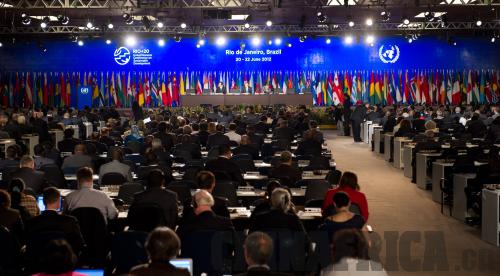|
 |
|
The United Nations Conference on Sustainable Development (Rio+20) was held in Rio de Janeiro, Brazil (WIN XINYANG) |
The United Nations Conference on Sustainable Development (Rio+20) was held in Rio de Janeiro, Brazil on June 20-22. This crucial meeting on international sustainable development came after the United Nations Conference on Environment and Development in Rio de Janeiro in 1992 and the World Summit on Sustainable Development held in Johannesburg in 2002. This time, people focused their attentions on whether the world could reach a consensus and take pragmatic actions on issues such as the global sustainable development, environmental protection and poverty alleviation programs.
Thanks to efforts from all parties, the conference produced a document entitled "The Future We Want." The document reiterates the principle of common but differentiated responsibilities, details the importance of the green economy as a tool for achieving sustainable development and requires developed countries to help developing countries strengthen their capacity building.
More internal efforts needed in Africa
African countries were seriously impacted by the global financial crisis as well as climate and environment changes. It is an important issue for the whole African continent to realize sustainable economic development. Fortunately, starting in the 1990s, the sub-Saharan African countries have seen sound and stable economic development with an annual economic growth of nearly 6 percent. In eight out of the past 10 years, Africa's growth was faster than that of East Asia, including Japan.
However, analysis shows that the rosy prospects of economic development in Africa are not completely stable. Africa's economic growth is mostly pushed by foreign investment, such as increased oil and natural gas production resulting from the great demands from the international market and rising oil prices, new investments on exploring mineral resources and soaring prices of raw materials.
In this context, in terms of maintaining sustainable development, Africa should make more internal efforts in order to maintain the current trend of economic development and stable growth. These efforts include improving political stability, strengthening domestic political democratization and economic institutional reform, encouraging scientific and technological innovation and progress, promoting regional economic integrity and getting rid of the singular economic structure of relying on foreign investment.
Frequent conflicts and wars have ruined the efforts of Africa in developing a stable economy and strengthening its unity. They also led to a series of political and social problems such as refugees, and weapon and drug smuggling. In 2011, the constant political turmoil in North Africa led to zero economic growth in the region.
In addition, African countries should make efforts to strengthen regional trade arrangement by promoting regional integrity, improving investment environment and deepening financial reforms to explore the domestic and international financial resources, and stressing local human resource development. To achieve these goals, African countries should first realize economic integrity by opening up their markets to each other to strengthen their trade capacity in the international market. Similar to India's focus on the software industry and the Taiwan region's focus on semiconductor and micro-electronic manufacturing technologies, African countries can also focus on the detailed work divisions of an industry in order to become integral links in the industrial chain.
International assistance also crucial
More importantly, the international community should make efforts to create a sound international environment for Africa's economic growth and development. Definitely, other countries should not significantly reduce their assistance to Africa because of the economic crisis; instead, they should come together to cope with these challenges and promote South-South Cooperation and South-North Cooperation.
Northern developed countries should carry out their commitments to assist Africa without delay even as they face the economic crisis in order to promote economic development on the continent. Especially, developed countries should open up their market to African products in order to improve Africa's export conditions and trade environments.
In terms of South-South Cooperation, thanks to the vibrant economic development of emerging economies such as China and India and the increasingly closer economic ties between Africa and Asia in the past 20 years, Africa's sustainable economic development and the economic development of emerging countries in Asia are benefiting and promoting each other on a win-win basis. For instance, China has contributed to more than 20 percent of Africa's economic growth. China is now Africa's largest trade partner, surpassing the United States in 2009.
The Forum on China-Africa Cooperation initiated in 2000 is a new measure and plan aimed to promote sustainable development in Africa. The first FOCAC Ministerial Conference in 2000 stressed debt exemption; the second conference in 2003 focused on human resource training, making contributions to human resource development in Africa. In 2006, when the Beijing Summit was held, China made commitments in eight steps in areas such as debt exemption, investment, assistance and people's livelihood improvement, pushing Sino-African relations to a higher level. The fourth conference in 2009 continued the efforts in these areas and put forward new measures in areas such as environmental protection, clean energy, sci-tech cooperation and supporting financing of small and medium-sized enterprises in Africa.
At the Rio+20, Premier Wen Jiabao, on behalf of the Chinese Government, committed to new measures promoting sustainable development of developing countries, including African countries, such as training administrators and technicians in areas including ecological protection and desertification control.
(The author is the director and researcher of the Center of African Studies with the Institute of West-Asian and African Studies at the Chinese Academy of Social Sciences) |